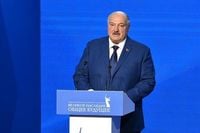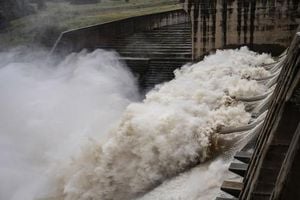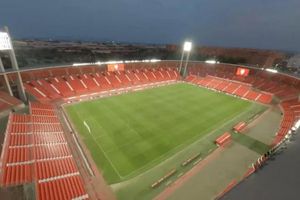On April 29, 2025, the Presidents of Russia and Belarus, Vladimir Putin and Alexander Lukashenko, convened in Volgograd for the international forum of the Union State titled "Great Future - Common Future." This event commemorates the 80th anniversary of Victory in the Great Patriotic War, a significant occasion for both nations, as it resonates deeply with the historical narratives of their peoples.
During the forum, Putin emphasized the importance of protecting historical truth, stating, "Victory Day remains one of the most sacred holidays for the peoples of the former USSR." He underlined the necessity of creating a commission dedicated to safeguarding historical memory, asserting, "Eurasia should be a space of peace and stability." This call to action comes amidst rising concerns over the rehabilitation of Nazism and increasing anti-Russian sentiment globally.
Lukashenko, who arrived in Volgograd to bolster union initiatives in the humanitarian sphere, echoed Putin's sentiments. He participated in a poignant ceremony alongside Putin, where the two leaders laid flowers at the memorial complex "To the Heroes of the Battle of Stalingrad" on Mamaev Kurgan, honoring the sacrifices made during one of World War II's most pivotal battles. The memorial stands as a testament to the bravery of those who defended Stalingrad, featuring the iconic 85-meter sculpture "The Motherland Calls!" and various commemorative spaces.
In a speech at the forum, Lukashenko criticized Western nations, expressing skepticism towards their promises. He remarked, "You are to us. We are to you. You taught us that way. This is not our formula of mutual relations," emphasizing a pragmatic approach to international relations based on actions rather than words. His remarks hinted at a forthcoming announcement, stating, "When we are promised much, maybe not everyone knows everything yet, but soon you will find out." This statement has sparked curiosity about what developments may be on the horizon for Belarus and its relationship with Russia.
The forum gathered over 450 delegates from 20 countries, including China, North Korea, Cuba, and Vietnam, highlighting the international interest in the discussions surrounding historical memory and humanitarian cooperation. This diverse representation underscores the significance of the forum's objectives, which aim to preserve the historical narrative of the Great Patriotic War and strengthen ties within the Union State.
As the forum progresses, Putin and Lukashenko are expected to engage in further discussions about the strategic partnership between their nations. The leaders will address pressing issues related to regional security and cooperation, reaffirming their commitment to a united front in the face of geopolitical challenges.
The memorial complex in Volgograd is not just a site of remembrance; it serves as a symbol of the enduring bond between Russia and Belarus. The events at Mamaev Kurgan remind attendees of the sacrifices made during the war and the shared history that continues to shape the identities of both nations.
In conclusion, the forum "Great Future - Common Future" represents a critical moment for Russia and Belarus as they navigate the complexities of modern geopolitics while honoring their past. As both leaders advocate for the protection of historical truth, they also seek to solidify their alliance in an increasingly uncertain world.




